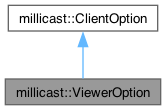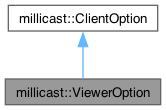#include <viewer.h>


Classes | |
| struct | ForcePlayoutDelay |
| Structure describing playout delay to be enforced on the client. https://webrtc.googlesource.com/src/+/refs/heads/main/docs/native-code/rtp-hdrext/playout-delay Setting both of these values to 0,0 will ensure that there is no playout delay added. More... | |
Public Attributes | ||
| struct { | ||
| std::optional< std::string > pinned_source_id | ||
| std::optional< uint8_t > multiplexed_audio_track | ||
| std::vector< std::string > excluded_source_id | ||
| } | multisource | |
| The structure describing viewership of multisource events. This is valid for events where multiple publishers sending sources to the server. With this struct you are able to choose what you want to view of these sources. | ||
| std::optional< ForcePlayoutDelay > | force_playout_delay | |
| The playout delay to enforce on the client side. | ||
| std::optional< unsigned int > | maximum_bitrate | |
| Set the maximum bitrate in KBps that can be used by the viewer. | ||
| bool | disable_audio | |
| int | jitter_minimum_delay_ms | |
| bool | force_smooth {false} | |
| std::optional< unsigned int > | bwe_monitor_duration_us | |
| overrides the duration of time over which bandwidth-estimate-calculations occur in usec By default this is 150msec, increasing this may smooth out transitions a little at the cost of NOT reacting to changes in the network as fast. | ||
| std::optional< unsigned int > | upwards_layer_wait_time_ms | |
| Duration the Transponder will wait before switching back to a higher layer in msec. Defaults to immediate which is 0. | ||
| std::optional< double > | bwe_rate_change_percentage | |
 Public Attributes inherited from millicast::ClientOption Public Attributes inherited from millicast::ClientOption | ||
| std::optional< bool > | stereo | |
| std::optional< bool > | dtx | |
| int | stats_delay_ms {3000} | |
| std::optional< DegradationPreferences > | degradation | |
| std::string | rtc_event_log_output_path | |
Member Data Documentation
◆ bwe_monitor_duration_us
| std::optional<unsigned int> millicast::ViewerOption::bwe_monitor_duration_us |
overrides the duration of time over which bandwidth-estimate-calculations occur in usec By default this is 150msec, increasing this may smooth out transitions a little at the cost of NOT reacting to changes in the network as fast.
◆ bwe_rate_change_percentage
| std::optional<double> millicast::ViewerOption::bwe_rate_change_percentage |
What percentage of the estimated larger bitrate will we increase by when we think the network is good. So if the previous estimate was 1mbps and the new estimate is 10mbps, and bweRateChangePercentage is 0.05, then 0.05*10mbps = 0.5mbps, so the new target at the end of the tick will be 1 + 0.5 = 1.5mbps This value can be reduced to increase more slowly under good conditions.
◆ disable_audio
| bool millicast::ViewerOption::disable_audio |
Do not offer to receieve audio streams from the millicast service. The server will not forward you any published audio streams for the event viewed.
◆ excluded_source_id
| std::vector<std::string> millicast::ViewerOption::excluded_source_id |
The list of sources you don't want to receive for the multi source event.
◆ force_playout_delay
| std::optional<ForcePlayoutDelay> millicast::ViewerOption::force_playout_delay |
The playout delay to enforce on the client side.
◆ force_smooth
| bool millicast::ViewerOption::force_smooth {false} |
Forces video to be sent on downlink when switching from higher quality layers
If true, smooth transitions will be enabled when changing from a higher rate to a lower rate, this may cause congested use cases to take longer to recover If false, then when switching from a higher rate to lower rate (due to congestion) we will stop sending video packets until the next I frame arrives at the new lower rate causing a pause but improving the impacts of congestion and recovering quicker
◆ jitter_minimum_delay_ms
| int millicast::ViewerOption::jitter_minimum_delay_ms |
The minimum jitter delay that packets of incoming audio/video streams will experience before being played out. This can be tuned to help with networks with higher latency, but be careful using it as it will introduce this delay.
◆ maximum_bitrate
| std::optional<unsigned int> millicast::ViewerOption::maximum_bitrate |
Set the maximum bitrate in KBps that can be used by the viewer.
◆ multiplexed_audio_track
| std::optional<uint8_t> millicast::ViewerOption::multiplexed_audio_track |
In the case of multiplexed audio tracks, select the number that you want to receive.
◆ [struct]
| struct { ... } millicast::ViewerOption::multisource |
The structure describing viewership of multisource events. This is valid for events where multiple publishers sending sources to the server. With this struct you are able to choose what you want to view of these sources.
◆ pinned_source_id
| std::optional<std::string> millicast::ViewerOption::pinned_source_id |
Select one of the incoming sources to pin as your main source.
◆ upwards_layer_wait_time_ms
| std::optional<unsigned int> millicast::ViewerOption::upwards_layer_wait_time_ms |
Duration the Transponder will wait before switching back to a higher layer in msec. Defaults to immediate which is 0.
The documentation for this struct was generated from the following file:
- api/millicast-sdk/viewer.h
Generated by